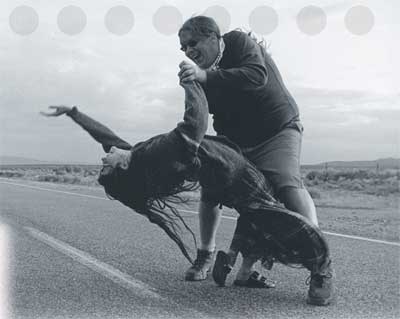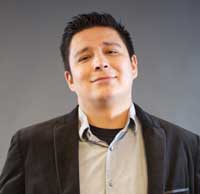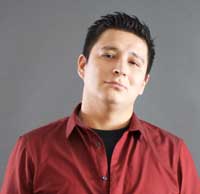 |
Canku Ota
|
 |
|
(Many Paths)
|
||
|
An Online Newsletter
Celebrating Native America
|
||
|
July 2016 - Volume 14
Number 7
|
||
|
|
||
|
Very Good Medicine:
Indigenous Humor And Laughter
|
||
|
by Cynthia Lindquist
with Mylo Redwater Smith - Tribal College Journal
|
||
Humor exists in many forms and is essential as a basic human need. Laughter is an instinctive behavior that binds people together through humor and play. Indeed, scientific research demonstrates that laughter is good medicine and there is documentation dating from as far back as the 13th century maintaining that humor and laughter help with healing and recovery from many ailments. Current research shows that laughter rids us of tension, stress, anger, anxiety, grief, and depression. Laughter releases endorphins, which in turn relieve pain. It also boosts your immune system, lowers blood pressure, reduces stress hormones, increases muscle flexibility, and is linked to healthy, functioning organs. Laughing makes people healthier, happier, and more efficient—people who have fun get more done. Laughter has always been a part of being Indian, and Native humor is culturally distinct and complex. Indigenous languages and storytelling are integral to the cultural uniqueness of Indian humor. There are male jokes and female jokes, and most all Indigenous languages accommodate a feminine or masculine version. Indian humor is unique and as such, is the heart of our resilience and survivability. Moral lessons and social order are embedded in storytelling, especially in trickster stories. Teasing someone is a way to point out that they might not be in step with tribal opinion or cultural norms. We like to make fun of ourselves and to not take ourselves too seriously. Humor is a way to understand and heal from personal or historical trauma, as well as a way to fight adversity. Today's artists, playwrights, and comedians bring attention and focus to stereotypes and the many serious issues in Indian Country. Humor and laughing are educational and help us to foster understanding and change by making us think about and see the world in a new way. My hunka (adopted) son, Mylo Redwater Smith, is a nationally known Indian comedian, humorist, and speaker. His personal story is one of survival. It is also rooted in humor and laughter— his chosen profession. Read his words …
Being able to laugh is a way to cope that promotes healing and unity. Indian humor is rooted in life lessons. It means laughing at the myriad of tests thrown at us since colonization. Keeping and maintaining that sense of humor has provided Indigenous people with a healthy escape. "When a people can laugh at themselves and laugh at others and hold all aspects of life together without letting anyone drive them to extremes, then it would seem to me that the people can survive," wrote Lakota scholar Vine Deloria Jr. in his landmark book, Custer Died for Your Sins. Native humorists, comedians, authors, and actors use humor to open our eyes to the stereotypes, historical trauma, and major issues confronting our communities. The weight of those burdens is eased by laughter that fosters social harmony and affirms shared attitudes and assumptions. Laughing together eases tension or negativity or anger for both individuals and the community as a whole. Humor helps us to get along better. Indians love to tease. A while back, when I was working on my doctorate degree, I went to visit two uncles on the Sisseton reservation. After hugs, inquiries about family members, some coffee, and food, they asked me how my dissertation writing was going. I responded that things were "O.K." and that it was coming along. One uncle said, "Well, we have a surprise for you and we've thought of a new Dakota name for you." Happy, I sat up straight and said, "Gee that's really nice!" Uncle went on to say, "Yes, my girl, a new Indian name." I was quiet but wanted to know what my new Dakota name was. Finally uncle said, "Your new Dakota name is Kunsi Doctor," and they both cracked up laughing—and so did I. Kunsi (pronounced "coo n che") is translated as "grandma," but can also mean "old lady." So, implying that it was taking me forever to write my dissertation and finish the Ph.D., my uncles gave me the Dakota name "Old Lady Doctor." It was a wonderful moment, and for a while I even had vanity plates with that name. "Humor can be used to remind people—who because of their achievements might be feeling a little too proud or important— that they are no more valuable than anyone else in the circle of life. Teasing someone who gets a little too 'tall' may help shrink them back to the right height," writes Abenaki author Joseph Bruchac. It is understood in Indian Country, that if you are being teased, you are "in" and part of the family and community. Sometimes non- Natives have difficulty understanding this concept. Laughing at ourselves is good medicine. Mylo explains Indian humor this way…
Everyone likes to laugh, and humor is not only good medicine, it is good for the soul. Laughing at yourself and with others eases the tribulations of life's journey. In the words of humorist Victor Borge, "Laugher is the shortest distance between two people." Cynthia Lindquist, Ph.D. (Dakota), is president of Cankdeska Cikana Community College and chair of the American Indian Higher Education Consortium's board of directors. Mylo Redwater Smith (Dakota) is a professional comedian. |
||||
|
|
||
|
|
||
| Canku Ota is a free Newsletter celebrating Native America, its traditions and accomplishments . We do not provide subscriber or visitor names to anyone. Some articles presented in Canku Ota may contain copyright material. We have received appropriate permissions for republishing any articles. Material appearing here is distributed without profit or monetary gain to those who have expressed an interest. This is in accordance with Title 17 U.S.C. Section 107. | ||
|
Canku Ota is a copyright ©
2000 - 2016 of Vicki Williams Barry and Paul Barry.
|
||
 |
 |
|
|
The "Canku
Ota - A Newsletter Celebrating Native America" web site and
its design is the
|
||
|
Copyright ©
1999 - 2016 of Paul C. Barry.
|
||
|
All Rights Reserved.
|
||

 I
was 19 years old when I decided to put the drugs and alcohol
down and begin applying what my grandma and grandpa taught
me. I started attending ceremonies and understanding the power
of life and the many gifts from Creator. With the encouragement
of my uncle, J.R. Redwater, and my childhood hero, Chance
Rush, I began working towards one of my lifelong goals of
doing comedy.
I
was 19 years old when I decided to put the drugs and alcohol
down and begin applying what my grandma and grandpa taught
me. I started attending ceremonies and understanding the power
of life and the many gifts from Creator. With the encouragement
of my uncle, J.R. Redwater, and my childhood hero, Chance
Rush, I began working towards one of my lifelong goals of
doing comedy. Indian
humor is much more than a social lubricant, it's a tool, an
attitude, a mentality…it's much more than a medicine.
Heck it's just our way of life! We are sure lucky to have
this in our culture. Think about this: as Native people we
are not strangers to hardships, but no matter what the obstacles
may be, we OVERCOME THEM! Not only do we overcome them, we
do it with a comedic attitude that makes the difference in
being resilient and achieving success! Indians, for example,
could be broke down on the side of the road, in 100 degree
heat, hours away from help, and sharing one bottle of water–but
there will be laughter coming from the group. That is just
who we are! We are constantly making lemons out of lemonade!
In my personal opinion we are the only race with this humor
mentality, and I have worked with many ethnic groups. As Indians
we keep our sense of humor alive and it gets us through the
hard times!
Indian
humor is much more than a social lubricant, it's a tool, an
attitude, a mentality…it's much more than a medicine.
Heck it's just our way of life! We are sure lucky to have
this in our culture. Think about this: as Native people we
are not strangers to hardships, but no matter what the obstacles
may be, we OVERCOME THEM! Not only do we overcome them, we
do it with a comedic attitude that makes the difference in
being resilient and achieving success! Indians, for example,
could be broke down on the side of the road, in 100 degree
heat, hours away from help, and sharing one bottle of water–but
there will be laughter coming from the group. That is just
who we are! We are constantly making lemons out of lemonade!
In my personal opinion we are the only race with this humor
mentality, and I have worked with many ethnic groups. As Indians
we keep our sense of humor alive and it gets us through the
hard times!